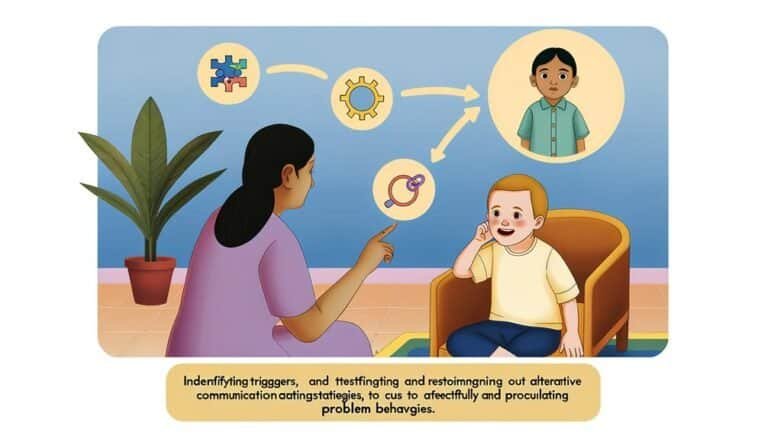How Can I Be More Vulnerable and Open up Emotionally?
Imagine your emotions as a locked treasure chest, filled with the raw, unfiltered essence of your innermost self. Opening up that chest and allowing others to see its contents can be daunting, yet the rewards of vulnerability are immeasurable.
But how can you begin to unravel the locks and share your emotional treasures with those around you?
Key Takeaways
- Emotional vulnerability is essential for building authentic connections and fostering emotional intimacy in relationships.
- Overcoming emotional barriers requires self-awareness, seeking support, reflecting on past experiences, and understanding fears and obstacles.
- Cultivating self-compassion and acceptance is crucial for embracing vulnerability and staying present with emotions.
- Practicing authentic communication, setting personal boundaries, and building trust through effective listening and open communication are key for being more vulnerable and open emotionally.
Understanding the Importance of Vulnerability
Understanding the importance of vulnerability is crucial for building authentic connections and fostering emotional intimacy in relationships. Vulnerability in relationships allows for genuine and deep connections to form. It creates an environment where both individuals feel safe to express their true feelings, thoughts, and fears without judgment.
By being vulnerable, you show your authentic self, which encourages your partner to do the same, leading to a deeper emotional connection. Emotional intimacy is nurtured through vulnerability, as it enables individuals to truly understand and empathize with each other's experiences and emotions. It fosters a sense of closeness and understanding that's essential for a healthy and fulfilling relationship.
Embracing vulnerability in relationships can lead to a stronger and more meaningful bond with your partner.
Identifying Your Emotional Barriers
Now, let's address the emotional barriers that may be hindering your ability to embrace vulnerability in your relationships.
Identifying fears and obstacles that prevent you from being emotionally open is an essential part of your vulnerability journey. Here are some key points to consider as you work on identifying your emotional barriers:
- Emotional Self-Awareness
- Reflect on past experiences and relationships to recognize patterns of emotional avoidance or resistance.
- Consider seeking the support of a therapist or counselor to delve deeper into your emotional landscape and gain insights into your barriers.
Overcoming these obstacles is a crucial step toward fostering genuine connections and intimacy in your relationships.
Cultivating Self-Compassion and Acceptance
You deserve kindness and acceptance, especially from yourself.
Embracing imperfections is an essential part of self-compassion and acceptance.
It's okay to be gentle with yourself and recognize that imperfection is a part of being human.
Self-Kindness and Acceptance
Cultivating self-compassion and acceptance is an essential practice for fostering emotional resilience and well-being. It's important to recognize the significance of being kind to yourself and accepting your own vulnerabilities. Here's how you can nurture self-kindness and acceptance:
- Self-Compassion Practice
- Be gentle with yourself during difficult times.
- Practice mindfulness to stay present with your emotions.
- Cultivating Vulnerability and Emotional Openness
- Acknowledge and embrace your feelings without judgment.
- Engage in open and honest communication with trusted individuals.
Embracing Imperfections
Embracing imperfections is an integral part of cultivating self-compassion and acceptance, allowing for genuine growth and self-discovery. Embracing flaws doesn't mean settling for mediocrity; it means acknowledging that everyone has shortcomings and that these imperfections don't diminish your worth.
Self-acceptance is a critical component of personal development. By adopting a growth mindset and understanding that mistakes are opportunities for learning and growth, you can create a more positive and nurturing relationship with yourself. Recognizing and accepting imperfections can lead to increased resilience, empathy, and a deeper understanding of both yourself and others.
Practicing Authentic Communication
You may find that practicing authentic communication can be both challenging and rewarding.
It involves honest self-expression, where you can openly share your thoughts and feelings with others.
Honest Self-Expression
Practicing authentic communication fosters deeper connections and encourages genuine understanding in relationships. When it comes to honest self-expression, it's important to remember that it's okay to feel vulnerable.
Here's how you can practice honest self-expression and strengthen your emotional resilience:
- Self-Compassion
- Be kind to yourself as you navigate your feelings and express them honestly.
- Embrace self-compassion as you open up, acknowledging that it's a courageous act.
- Setting Personal Boundaries
- Recognize and communicate your personal boundaries to ensure that your honest self-expression feels safe and respected.
- Establishing healthy boundaries helps create a supportive environment for your emotional growth.
Building Trust Through Communication
Building trust through authentic communication is essential for fostering meaningful and genuine connections in relationships. Effective listening and open communication are vital components in building rapport and fostering trust. By actively listening to your partner, you demonstrate empathy and understanding, creating a safe space for open dialogue. When communicating openly, it's important to express yourself honestly while also being receptive to your partner's thoughts and feelings. This reciprocal exchange of ideas and emotions cultivates trust and strengthens the foundation of your relationship. To illustrate the significance of authentic communication in building trust, consider the following table:
| Building Trust Through Communication |
|---|
| Effective Listening |
| Open Communication |
| Fostering Trust |
Embracing Vulnerability
Embracing vulnerability in communication allows for deeper emotional connections and fosters authentic understanding within relationships. It's not always easy, but embracing discomfort is the first step towards emotional growth. By accepting vulnerability, you open yourself up to personal growth and create space for authentic connections.
Here's a picture of what this might look like:
- Authenticity: Embracing vulnerability means being honest about your feelings and experiences, allowing others to see the real you.
- *Example*: Sharing your fears and insecurities with a close friend or partner, and feeling a sense of relief and closeness afterward.
- Empathy: Being vulnerable allows others to empathize with you, strengthening the bond and creating a safe space for reciprocal vulnerability.
- *Example*: Sharing a personal struggle with a friend, and in turn, they feel comfortable sharing their own challenges, deepening your connection.
Building Trust and Emotional Safety
Creating an environment of trust and emotional safety is essential for fostering genuine vulnerability and openness in relationships. Trust building is a gradual process that involves consistent honesty, reliability, and confidentiality. Open communication, active listening, and empathy are crucial for establishing emotional safety.
It's important to create a safe space where individuals feel heard, understood, and accepted without judgment. Emotional safety strategies include setting clear boundaries, respecting each other's feelings, and offering support during challenging times.
Building trust and emotional safety requires patience, understanding, and a willingness to be vulnerable yourself. Encouraging open dialogue about emotions and experiences can help cultivate an environment where individuals feel comfortable expressing their true feelings. Remember, it's a reciprocal process—by demonstrating trust and emotional safety, you can inspire others to do the same.
Embracing Imperfection and Growth
Understanding your own imperfections and embracing growth is a key aspect of fostering emotional vulnerability. Embracing growth means acknowledging that imperfection is a natural part of being human. It's about accepting that you're a work in progress and that personal development comes from embracing imperfections rather than striving for perfection.
This self-discovery process involves recognizing and overcoming fears, allowing yourself to make mistakes, and learning from them. It's about understanding that growth often comes from stepping outside of your comfort zone and being open to new experiences.
Embracing imperfection and growth allows you to cultivate a deeper sense of self-awareness and resilience, ultimately leading to greater emotional openness and vulnerability.
Setting Boundaries and Honoring Your Needs
It's important to prioritize your self-care needs and communicate your personal boundaries in order to honor your emotional well-being.
Setting boundaries doesn't mean you're being selfish; it's a necessary part of self-care and self-respect.
Prioritize Self-Care Needs
Taking the time to prioritize your self-care needs involves setting clear boundaries and unapologetically honoring what's truly important to you. It's essential to recognize that prioritizing self-care isn't selfish; it's a necessary part of maintaining emotional well-being.
Here's how you can prioritize your self-care needs:
- Self-Reflection and Self-Awareness
- Take time to reflect on what activities or practices bring you joy and rejuvenation.
- Be aware of your emotional and physical limits, and honor them without guilt or hesitation.
Communicate Personal Boundaries
When prioritizing your self-care needs, it's important to communicate your personal boundaries effectively, ensuring that you honor your needs without feeling guilty or hesitant. Establishing boundaries is crucial for maintaining healthy relationships and emotional well-being.
Start by clearly identifying what you're comfortable with and what makes you feel uneasy. Communicate these boundaries to others in a calm and respectful manner, emphasizing the importance of mutual respect and understanding. It's okay to say no when something doesn't align with your values or makes you feel uncomfortable.
Healthy communication involves being assertive yet considerate of others' feelings. Remember that setting boundaries isn't selfish; it's an essential part of self-care and self-respect.
Seeking Support and Connection
Seeking support and connection is essential for fostering emotional openness and vulnerability in your relationships. When seeking empathy and connection, consider the following:
- Building a Support Network:
- Surround yourself with individuals who prioritize open communication and empathy.
- Seek out friends, family, or support groups where you feel safe expressing your emotions.
When striving for vulnerability and support networks, it's crucial to remember that finding the right support is a continuous process. It's okay to take your time and seek out individuals who truly understand and value your emotional growth.
Nurturing Emotional Resilience
To nurture emotional resilience, it's important to prioritize self-care and develop healthy coping mechanisms. Developing resilience involves acknowledging your emotions and allowing yourself to experience them without judgment.
It's essential to create a support system of trusted individuals with whom you can share your feelings and experiences. Cultivating emotional intimacy within these relationships can help you build resilience by providing a safe space for vulnerability and open communication.
Additionally, practicing mindfulness and self-compassion can contribute to emotional resilience, as they encourage a greater awareness of your emotions and enable you to respond to them in a healthy manner. Engaging in activities that bring you joy and relaxation, setting boundaries, and seeking professional support when needed are also vital components of nurturing emotional resilience.
Embracing Vulnerability as Strength
Embracing vulnerability as strength allows you to harness the emotional resilience you've nurtured, transforming moments of openness into sources of empowerment and connection. By embracing vulnerability, you open yourself up to personal growth and inner strength. This allows you to approach challenges with a newfound sense of resilience and courage.
Embracing vulnerability also enables you to form deeper emotional connections with others, fostering a sense of empathy and understanding in your relationships. It empowers you to communicate more authentically, leading to genuine and meaningful connections.
Recognizing the strength in vulnerability not only enhances your own well-being but also creates a space for others to embrace their vulnerabilities, ultimately fostering a community of support and understanding.
Conclusion
Remember, vulnerability isn't a weakness, but a strength. It takes courage to open up and show your true emotions.
So, be kind to yourself as you navigate this journey. Embrace the discomfort and allow yourself to be seen and heard.
You aren't alone in this process, and with time and practice, you'll find the freedom and connection that comes with being emotionally open and vulnerable.
Keep going, you've got this.





